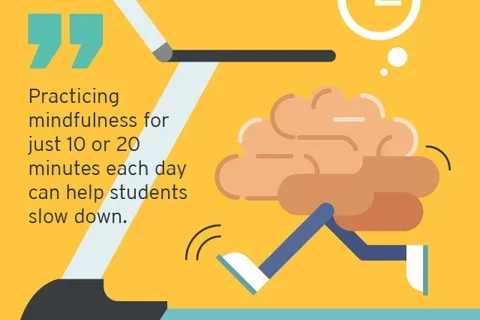Quick Brain Exercises for Medical Students
How to Keep Your Mind Sharp and Clear

It Only Take a Few Minutes to Slow Down, Be Mindful and Achieve Clarity
Medical students face significant pressure, particularly in the first few years of school. In new places, surrounded by new people, students must learn a lot in a short time. On top of that, students have to make big decisions about their futures. Everything combined makes it easy for minds to go into overdrive.
Practicing mindfulness for just 10 or 20 minutes each day can help students slow down.
Part of the UCLA Interdepartmental PhD Program for Neuroscience, Martin Safrin is also a UCLA Mindful Awareness Research Center-trained mindfulness facilitator. He shares a few brain exercises that help ease racing minds, keeping them sharp, resilient and ready to learn. Mindful awareness takes time for anyone to master, so Safrin recommends practicing at least one exercise every day.
"The term mindfulness is often misused, but it generally means having an awareness and acceptance of the sensory experience of the present moment," Safrin says. "Pay attention to your emotions, accept them and notice what's happening in your mind. Accept what's happening as it happens."
Make Friends With Your Racing Mind

For many, trying to process racing thoughts leads to an overwhelming, often upsetting, snowball effect of mind stories. Safrin recommends breaking thoughts into parts. "Pay attention to the sensory aspects," Safrin says. “Are there images flashing through your mind? Is there a verbal energy? Get to know these patterns, without grasping at or suppressing this activity."
Safrin says labeling thoughts can make them easier to process. Labeling thoughts interrupts the mind’s desire to find meaning and helps many people achieve clarity.
- Use "seeing" for visual images that run through the mind.
- Use “hearing” for internal self-talk.
- Use “feeling” for emotions.
- Find appropriate labels for miscellaneous thoughts, including “worrying,” “planning,” or “remembering.”
- Replace overwhelming ideas
When ideas become too overwhelming, many people search for a positive replacement — similar to the idea of finding a happy place. Choose a phrase or word that is positive and repeat it whenever negative thoughts become overpowering.
Focus on Something Else
During mindfulness practice, meditators change focus from thoughts to breathing. Many beginners mistakenly assume they must find stillness in a breathing meditation, but the mind races more when you try to stop it. Don't fight your thoughts: let them come and go, and always return focus to the breath.
"These strategies help us prevent the mind from getting stuck in habitual patterns," Safrin says. "This frees up more energy, keeping the mind more fluid and resilient, yielding insights, creativity and kindness."
The David Geffen School of Medicine at UCLA has a range of resources for students, including guided online meditation and in-person mindfulness classes.



